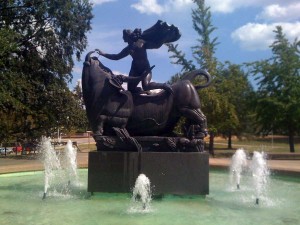
The Department of English has a long history of excellence, an excellence made possible in no small part because of the generosity of many donors. We are, in part, a department of teachers, and we seek to make the undergraduate and graduate experiences of our students exciting, challenging, and rewarding. The department offers various grants to support graduate student research and presents annual awards for excellence in graduate scholarship and teaching. The department also awards undergraduate scholarships to superior and deserving students. A series of campus lectures sponsored by the department brings distinguished scholars and creative writers in a variety of fields to challenge and broaden the perspectives of our students.
The Department of English appreciates the continued generosity of its many supporters. This generosity plays a large part in the department’s ability to provide these lectures, grants, and scholarships. Interested parties may contribute to the department’s general English Enrichment Fund or to the John C. Hodges Better English Endowment.
English Enrichment Fund
The English Enrichment Fund is for unrestricted gifts. This fund is used where the need is greatest. In the past, it has been used to support faculty research, interdisciplinary programs, and graduate education. This fund enables the department to plan for long-term goals and to quickly respond to issues of immediate concern.
Department of English
301 McClung Tower
University of Tennessee, Knoxville
Knoxville, TN 37996-0430
John C. Hodges Better English Endowment
The John C. Hodges Better English Endowment supports many initiatives including graduate student fellowships, research assistantships, summer research grants, faculty professional development, library acquisition, lectures and conferences, and community outreach.
If you are interested in contributing to the department’s endowment, please make your check payable to the University of Tennessee Department of English. Please indicate that the check is for the Hodges Better English Endowment and mail it to the following address:
Department of English
301 McClung Tower
University of Tennessee, Knoxville
Knoxville, TN 37996-0430
Patsy G. Hammontree Literary Endowed Scholarship
A 1954 graduate of Tennessee Tech with a degree in English and history, Hammontree taught American history at South Harriman High School for two years and English at Lenoir City High for 11 years. On receiving her master’s degree in English from UT in 1967, she joined the UT English department as an instructor and taught various freshman and sophomore courses.
1. Applicants must be currently enrolled at or admitted to attend the University of Tennessee Knoxville in the College of Arts and Sciences.
2. Preference will be given to:
• Applicants pursuing a major in the College of Arts and Sciences, Department of English.
• Applicants qualifying for Honors English courses
• Applicants that demonstrate successful academic performance.
• A student holding the Patsy G. Hammontree Literary Endowed Scholarship in one year shall have preference in subsequent years.
• Financial need may be considered.
Keene Award for Excellence in Technical Communication
Michael L. Keene, 2004 recipient of the Jay R. Gould Award for Excellence in Teaching Technical Communication, lead editor for the STC publication Education in Technical Communication: Academic Programs That Work, and a lifelong active and contributing member of STC, passed away in February. You can view his obituary here.
The award will be open to all applicants regardless of race, color, religion, sex, national origin, citizenship, disability, age, or veteran status, subject to the following criteria:
1. Applicants must currently be enrolled at The University of Tennessee, Knoxville.
2. Applicants must be pursuing a major in English with a concentration in Technical Communication or in Rhetoric & Writing.
3. While enrolled as students at UT Knoxville, applicants must demonstrate excellence in technical communication through their coursework and in other ways (such as service to professional societies, community, journals, research projects; contributions to departmental initiatives; conference participation; publications, etc.).
4. When choosing the Award recipient, the Keene Award Committee may consider, in addition to demonstrations of excellence as described above, the applicant’s financial need.
5. Applicants may receive the Keene Award only once.